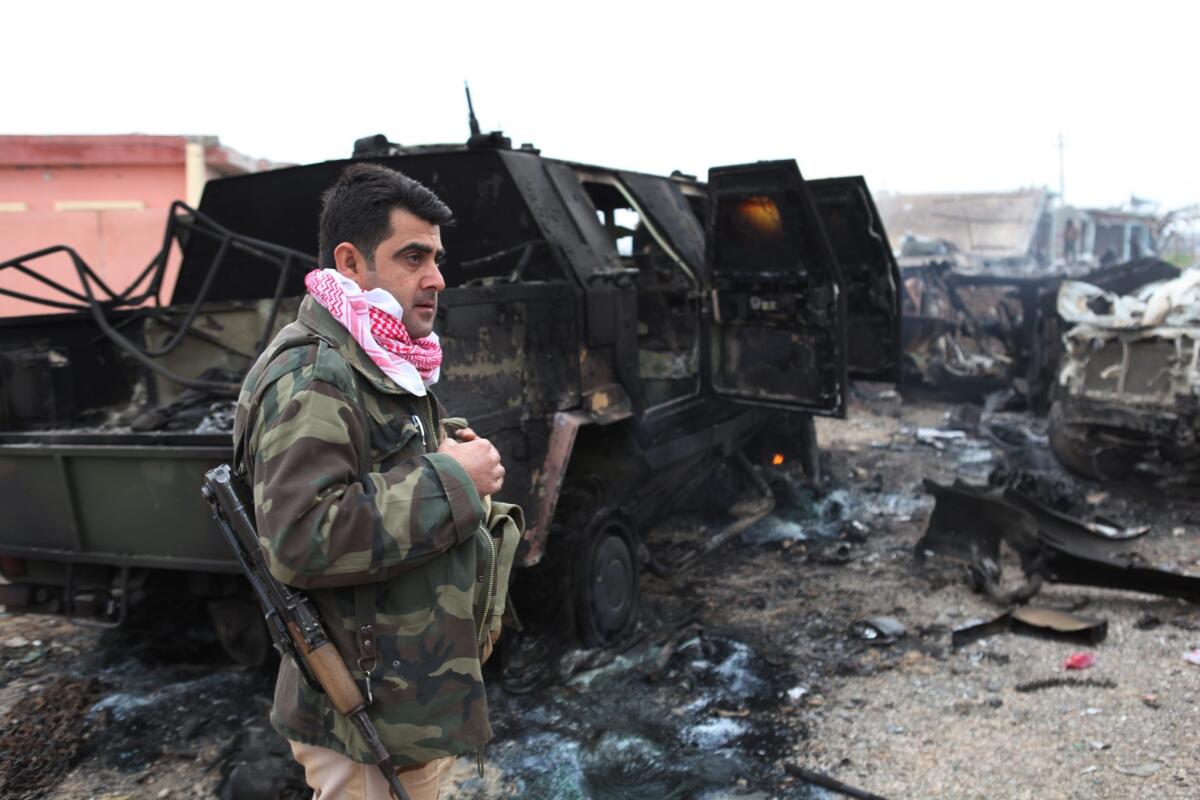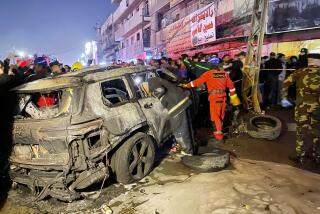Kurdish fighters in Iraq make headway in battle against Islamic State

Kurdish forces backed by U.S.-led airstrikes have gained ground against Islamic State militants in northern Iraq, potentially clearing an escape route for persecuted minorities remaining on and near Mt. Sinjar.
The offensive, begun this week, paired the aerial assault with thousands of Kurdish peshmerga fighters in what Kurdish officials called the largest attack so far in the fight against the militants, also known as ISIS.
“ISIS elements are starting to flee and leave the area; their morale is very low,” Masrour Barzani, leader of the Kurdistan regional government’s security council, said in a statement late Thursday. He called it “the biggest military operation so far conducted against ISIS … the biggest victory of the peshmerga in this war.”
Islamic State’s August siege of Mt. Sinjar drew international attention and eventually prompted President Obama to approve the campaign of airstrikes -- nearly 1,400 to date -- after thousands of members of the local Yazidi minority community were trapped. Many were subsequently able to flee the area, though others remain.
Humanitarian aid flowed into the area and Yazidis fled into the Kurdish region and neighboring Syria, where they were later pushed out again by fighting.
“This is a war that the peshmerga are fighting on behalf of the rest of the world,” Barzani said, adding that Kurdish fighters proved that “protecting innocent lives, the principles and values of democracy and respect for other religions is much more important than the destruction and killing machines that ISIS has brought to this country.”
Rear Adm. John F. Kirby of the U.S. Navy confirmed reports that the airstrike campaign, dubbed Operation Inherent Resolve, had killed several Islamic State leaders, although he would not identify them or their rank within the extremist group, except to say that their deaths damaged the group’s command structure.
“Combined efforts like these are having a significant effect on Daesh’s ability to command and control, to resupply, and to conduct maneuvering,” Kirby said, using an Arabic acronym for Islamic State.
The 53 airstrikes at Sinjar destroyed Islamic State buildings, bridges, guard towers and vehicles, U.S. Army Lt. Gen. James L. Terry, the Kuwait-based commander of the campaign, said Thursday.
Fifteen more airstrikes followed Friday – four in Syria and 11 in Iraq, including near Mt. Sinjar and to the east in Tal Afar, striking Islamic State units at both locations, according to a statement from the U.S. military.
The United States is sending an additional 1,500 military advisors to Iraq, Terry said, bringing the total to more than 3,100, though he added that they still will be deployed to train local forces, not join the fight – except from the air.
“Iraqi security forces must be a capable force -- one that can restore Iraq’s sovereign borders, retake territory from Daesh and secure the Iraqi people,” he said. “An offensively minded and trained security force, backed by an inclusive government of Iraq, is the key to future stability.”
The Iraqi army has been fending off Islamic State fighters in the country’s north and on several other fronts: to the west in largely Sunni Anbar province, to the east in Diyala, in the heart of the country near Samarra and the Baiji oil refinery, and in the belt of towns surrounding the capital.
An important component of that effort has been enlisting the help of Sunni Muslim tribes to fight Islamic State, which is also Sunni but fundamentalist. Any attempt to create a viable fighting force against the group, however, will be difficult; many Sunnis are suspicious of Shiite Muslims, who now dominate the Iraqi government and are often accused of persecuting Sunnis.
After the U.S invasion of Iraq in 2003, sectarian fighting broke out. The uprising in neighboring Syria, now in its fourth year, also devolved into a sectarian-fueled civil war.
On Thursday, Obama phoned Iraqi Prime Minister Haider Abadi to praise him for governing inclusively and building a united front among Iraqis to fight Islamic State. The president also “reiterated his commitment to supporting the Iraqi security forces’ success through train and assist programs, provision of weapons and equipment, and airstrikes,” the White House said.
In a Facebook post following the phone call, Abadi said he had told Obama of recent victories by Iraqi forces, as well as their efforts to recruit Sunni tribesmen to fight Islamic State. He called for more support from the international community in a war that he said threatens not just Iraq, but also the region and the world.
“With support from the international coalition and closer coordination with the Kurdish peshmerga fighters, the Iraqi security forces and their partners are pushing forward, recapturing strategic roads and other locations and liberating entire towns,” Abadi wrote in an op-ed for the Wall Street Journal on Thursday. “Iraqis are doing our part to defeat the best-funded, best-equipped and best-organized terrorists on Earth. But the challenge is greater than any country can answer alone.”
Times staff writer Hennessy-Fiske reported from Baghdad and special correspondent Bulos from Beirut.
Follow @mollyhf on Twitter for reports out of Iraq
More to Read
Start your day right
Sign up for Essential California for news, features and recommendations from the L.A. Times and beyond in your inbox six days a week.
You may occasionally receive promotional content from the Los Angeles Times.







